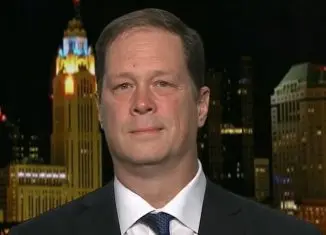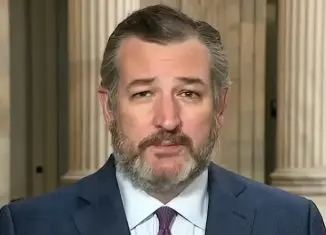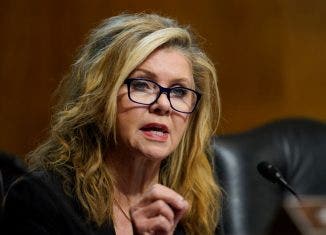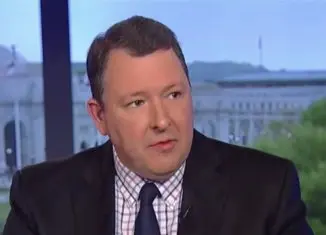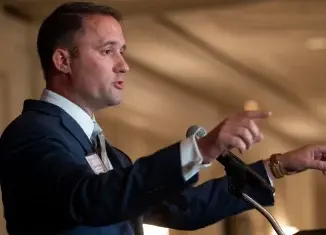Senate Majority Leader Mitch McConnell On Sexual Assault Allegations Against Biden vs Kavanaugh: Such Accusations Should Be “Dealt With Symmetrically” By The Media
Senate Majority Leader Mitch McConnell talks with Fox News Radio’s Guy Benson about the reconvening of the Senate amid the Coronavirus pandemic and the progress on negotiations for state and local funding. McConnell also responded to reports of sexual assault allegations against democratic presidential candidate Joe Biden. Comparing the media’s coverage to now Supreme Court Justice Brett Kavanaugh confirmation hearings. Saying such accusations should be “Dealt With Symmetrically” by the media.
Listen To The Full Interview Below:
Full Transcript:
GUY BENSON, FOX RADIO HOST: Joining me now is the majority leader of the United States Senate, Senator Mitch McConnell Republican of Kentucky. Senator, great to have you back here.
SEN. MITCH MCCONNELL (R-KY): Glad to be with you, Guy.
BENSON: I want to play for you just a sound bite from a radio interview you did last week with my friend Hugh Hewitt. It got some attention. Cut 26.
(BEGIN AUDIO CLIP)
MCCONNELL: I would certainly be in favor of allowing states to use the bankruptcy route it (ph) — to save some cities. My guess is their first choice would be for the federal government to borrow money from future generations to send it down to them now, so they don’t have to do that. That’s not something I’m going to be in favor of.
(END AUDIO CLIP)
BENSON: So, Speaker Pelosi said that you in that clip were saying that quote “States should go bankrupt. It’s clear, visible within 24 hours how the Republicans reject science and reject governance.” Meanwhile, the Governor of New York, Andrew Cuomo, went after your state saying that Kentucky is a taker, New York is a giver, and it’s New York that’s bailing out states like Kentucky. He’s been very upset with you. I just want to get your response to what Speaker Pelosi, Governor Cuomo said on this issue of giving federal assistance to state and local governments about coronavirus response and relief.
MCCONNELL: So what (ph)? You know, I wasn’t saying they had to take bankruptcy. I think it’s just an option to be looked at, that unfortunately states don’t have that option now, cities do. I wasn’t necessarily recommending it, but I was pointing out that they have their own fiscal problems that predate the coronavirus, and I was not interested in borrowing money from future generations to fix age-old problems that states have that they created themselves wholly unrelated to this.There probably will be another state and local funding bill, but we need to make sure that we achieve something that will go beyond simply sending out money. For example, here’s something I just announced today that’s going to be my redline for the next negotiation. We have brave healthcare workers battling this virus, entrepreneurs who will reopen their economy, all of whom deserve, in my view, strong protections from the opportunistic lawsuits that are being planned all over America, all over America. The lawyers – trial lawyers are sharpening their pencils to come after healthcare providers and businesses, arguing that somehow the decision they made with regard to reopening adversely affected the health of someone else. So before we start sending additional money down to states and localities, I want to make sure that we protect the people we’ve already sent assistance to, who are going to be set up for an avalanche of lawsuits if we don’t act. So that is an example of a way that we can bring about a reform that is important to protect those that we’ve been providing assistance to.
BENSON: Yes, I think that’s interesting because virtually everyone, you would think, would want to protect healthcare workers from frivolous lawsuits, but there is a very strong financial interest and lobby on the other side of the aisle with trail lawyers, so there might be a bit of a butting of heads there on the Democratic side. I just want to come back to this issue of state and local assistance, because when I saw these quotes and people coming after you very hard, I had not seen or heard your exact quote, and I just – my antenna went up. I was suspicious. I’m like, I really would be surprised if McConnell said these people are all going to fend for themselves. We’re not giving them a dime. Good luck. Go bankrupt. That’s sort of the cartoon version of what you said. Here’s where I’m coming at this from just as a conservative, Senator. I think that it’s totally reasonable for states and localities to say, because of a massive strain due to this pandemic, they might need to be made whole or helped on some level by the federal government. I’m not against that personally. My concern is this. I don’t want a single taxpayer dime to go into the coffers of a state like Illinois or California that has been governed terribly, that have all these, as you said, fiscal woes that predate coronavirus. I don’t want to give a single dime to help fix those self-created problems. So the question is, how do you structure assistance to states and localities to help them with the current need related to the health crisis, but doesn’t bleed over into basically bailing them out for previous bad decisions that have nothing to do with coronavirus?
MCCONNELL: It’s a challenge. I mean, in the — as you know, and I’m sure you talked about this here. Listen, we’ve already I think allocated $150 billion to save local government, and we–
BENSON: Right.
MCCONNELL: — had it confined to the coronavirus expenses. And many states are saying, well that’s too strict, change the definition, we can’t use the money the way we would like to use it. So, it is challenging. We do want to help them with expenses that are directly related to the coronavirus outbreak. But we’re not interested in helping them fix age-old problems that they haven’t had the courage to fix in the past. So–
BENSON: Yes.
MCCONNELL: — it is — it’s a drafting challenge. And also not to just continue to go over the same thing, but in addition to that we need these litigation protections — some of which was done previously, but not nearly broad enough, to protect both the first responders and the businesses that have courage to go on open up knowing full well they may get sued by somebody who claims that because they violated CDC recommendations they’re responsible for somebody’s illness. The whole country will be afraid to go back to work. If businesses — afraid to open up if businesses are afraid they’re going to be sued constantly, and I think that’s the plan (ph) of the (inaudible) if we don’t fix it.
BENSON: So it looks like you’re saying that your redline in this next round of negotiations, you’re open to more assistance to states and cities, but you want to make sure that the money isn’t going to preexisting fiscal problems, and you also want to make sure there’s some sort of indemnification for healthcare workers and certain businesses from frivolous lawsuits as the country starts to open back up.Those might be some of your top lines and redlines. What’s your broader plan? And I know you made an announcement earlier about reconvening the Senate. What’s the plan from Senate Republicans about how to continue rolling out coronavirus relief in a way that’s thoughtful and actually has more buy in from more Senators who actually show up for work?
MCCONNELL: Yes. Well look, we’re going to return a week from today. We’ll modify routines in ways that are smart and safe, but will honor our constitutional duty to the American people and conduct critical business in person here in Washington. If doctors and nurses and healthcare workers and truck drivers and grocery store workers and many other brave Americans are showing up for work and doing their duty to try to keep the economy open and people protected, the least we can do is come back to work. And we’re going to do that starting next week. We’ll follow the advice we’re given about working together safely, and there’s no reason why we can’t do that. And the next time we pass one of these relief bills — and we probably will – it will be more directly involved with everybody back here able to discuss things more easily than remotely. And as I indicated, and as you underscored, liability protection for those who have been brave enough to see it through this is the one thing that will be a part of any new bill.
BENSON: I want to ask you about a shift at the White House that has been reported. President Trump, he’s also reflected this in his tweets, that he’s planning on sort of pairing back or changing the nature of these daily press briefings.There’s been quite a lot of reporting that there are Republican allies inside the White House and beyond the White House that have been urging them to make this change. They’re too long, they’re too unwieldy, they go on forever. It’s very hostile with the press, maybe being counterproductive. Do you think that perhaps shortening the briefings or the president not necessarily showing up everyday, is that a change that you see as wise?
MCCONNELL: Well, certainly what the American people are most interested in is advice from health professionals about how to conduct their daily lives safely, and to the extent that the White House decides to re-craft those briefings to reflect that goal — probably a good idea.
BENSON: Another topic I want to breach with you here, and it has a real distinct call back to something you spent a lot of time and energy on in 2018, something that you and I have spoken about in the past, and that is the current allegation that has been leveled against Joe Biden, the presumptive Democratic nominee for president, against a woman named Tara Reade.She says that in 1993 she was working for him in the Senate, he sexually assaulted her. And there are now four people who have confirmed that she told them that at the time, some other potential confirming evidence involving a phone call that was placed in the “Larry King Show” back in 1993 by Tara Reade’s mother talking about her daughter having problems with a prominent Senator at the time. I’m wondering what you think, Senator, should be the basis for consideration as Americans think about the allegation against Joe Biden. What is a fair way of contemplating the allegation in a way that respects due process and the presumption of innocence? And relatedly, do you have any thoughts as you hearken back to the Kavanaugh affair and the feeding frenzy from the media and many of your Democratic colleagues, and sort of the standards that they erected for this sort of thing, how those standards are now being applied to Joe Biden?
MCCONNELL: Well, at the very least it’s pretty obvious that the same people who were outraged about allegations — unproven allegations against Justice Kavanaugh when he was in high school seemed to have little or no interest, or certainly not as much interest and suggestions of improper behavior by an adult who’s in the Senate. I think if — these things ought to be dealt with symmetrically no matter who the accuser is and no matter who the accused is. I think what most Americans would like is sort of a symmetrical evaluation of these allegations rather than what we have seen at least so far.
BENSON: Biden has not been asked about this directly. He has not said a word about it. Is that a strategy that you think could have worked for Brett Kavanaugh?
MCCONNELL: No, I don’t think that would have worked for Justice Kavanaugh —
BENSON: Neither do I.
MCCONNELL: And — and look, I — you know the — I can’t imagine that this kind of an issue isn’t going to be discussed during the presidential campaign. Surely those in the reporting world who were so animated about the investigation of Justice Kavanaugh would have an equal interest in — in this subject.
BENSON: Political question now about your Senator majority. There has been some reports bubbling up out there that Democrats that are feeling increasingly bullish on maybe taking back the majority. They cite polling, they cite — they cite fundraising. And it does look like, at least in some of these competitive races, Democrats are surging ahead. There also looks to be a bit of a fundraising gap where Democrats are taking a significant advantage on that front. What is your current assessment of the state of play, and for conservatives — because I keep reading that there are some Republicans and donors who are just convinced you guys are fine, you’re going to keep the majority? To me, that seems kind of insane, right? It’s going to be a real tough dog fight for control of the Senate. I just want to get your analysis of where things stand and what you think of people who might be a bit complacent on that front?
MCCONNELL: Yes. Let me just say that the Senate majority has not been a certainty at any point this cycle. We always knew from the beginning, and I’ve said consistently there’s going to be a dog fight. The other thing that’s not new is that we’re being outspent these days. We were outspent in 2016 and held the majority. We were outspent in 2018 and held the majority. We were outspent in every single race that we won in 2018 — and we were outspent. So I think it is also true that the Democrats are doing a better job of raising funds in recent years than we have. But we took the Senate in 2014, we kept it in 2016, and we increased our number in 2018. So the fact that Democrats are raising more money shouldn’t raise any eyebrows. That’s been the – been the case. Now, we do have a lot of exposure. This is the big class that took the majority in 2014, so we have a lot of people up. Twenty-three seats to defend. They only have 12. We have one really good pick up opportunity in Alabama and another really good pick up opportunity in Michigan. Everywhere else we’re on defense. So whether you’re on offense or defense sort of depends upon how you did six years before. And since we had such a great year in 2014, yes, we’re on defense in a lot of places. But these are very sharp people who took us to the majority, people like Steve Daines and Cory Gardner and Martha McSally, Joni Ernst, Thom Tillis, Susan Collins. All but Martha were on the ballot in ’14. They’re all sharp. She is as well. And look, I think it’s a tough fight. We don’t have a lock on it, nor do they. It’s going to be a fight to the finish or like a knife fight in an ally.
BENSON: Yes, and since we invoked the Kavanaugh contretemps in this conversation earlier, I think that is a real focal point, at least in mind, a reminder of the stakes when it comes to every one of these races. And the majority matters immensely, particularly on big, ugly, nasty, high-stakes battles like a Supreme Court confirmation. So just something for our listeners to keep in mind.Senator McConnell, before you go, I just want to say last week we had on the show for the first time the secretary of Transportation, and just in case you happen to run into her, please let her know we had a great time. She’s a great interview.
MCCONNELL: I will. We’re both at home, so I’ll run into her at dinner.
(LAUGHTER)
BENSON: Fantastic. Senator Mitch McConnell, Republican of Kentucky, the majority leader of the U.S. Senate. Thank you, Senator.
MCCONNELL: Thank you.


